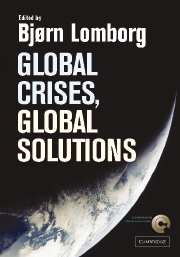Book contents
- Frontmatter
- Contents
- List of figures
- List of tables
- List of boxes
- List of contributors
- Acknowledgements
- List of abbreviations and acronyms
- Introduction
- PART I THE CHALLENGES
- 1 Climate change
- 2 Communicable diseases
- 3 Conflicts
- 4 Access to education
- 5 Financial instability
- 6 Governance and corruption
- 7 Malnutrition and hunger
- 8 Migration
- 9 Sanitation and access to clean water
- 10 Subsidies and trade barriers
- PART II RANKING THE OPPORTUNITIES
8 - Migration
Published online by Cambridge University Press: 22 September 2009
- Frontmatter
- Contents
- List of figures
- List of tables
- List of boxes
- List of contributors
- Acknowledgements
- List of abbreviations and acronyms
- Introduction
- PART I THE CHALLENGES
- 1 Climate change
- 2 Communicable diseases
- 3 Conflicts
- 4 Access to education
- 5 Financial instability
- 6 Governance and corruption
- 7 Malnutrition and hunger
- 8 Migration
- 9 Sanitation and access to clean water
- 10 Subsidies and trade barriers
- PART II RANKING THE OPPORTUNITIES
Summary
Description of the Challenge
Migration and Economic Efficiency
In an ideal world, there would be few migration barriers and little unwanted migration. For most of human history, there were few governmental barriers to migration, and the challenge of too many people for available resources and technologies meant that people migrated from one place to another in response to famine, war and displacement in traditional economies. However, migration was often limited by nascent communication and transportation networks as well as institutions and rules from slavery to serfdom.
There was migration in the pre-industrial world, including the great migration of 60 million Europeans to the Americas in the nineteenth and early twentieth centuries. During the twentieth century, the world's population increased fourfold, and sharply different rates of population and economic growth emerged between the world's nation-states, whose number quadrupled to about 200 in the twentieth century. Most nation-states have more workers than formal sector jobs, and young people who know that wages are ten or twenty times higher in another country are especially eager to cross national borders, putting international migration ‘close to the center of global problems’ (Bhagwati 2003a, 82).
If people were goods, the solution to different wage and employment levels would be obvious: encourage the transfer of ‘surplus’ people from poorer to richer nation states, which should benefit individuals whose incomes rise, increase global GDP and promote the convergence in wages and opportunities between sending and receiving areas that eventually reduces migration pressures.
- Type
- Chapter
- Information
- Global Crises, Global Solutions , pp. 443 - 497Publisher: Cambridge University PressPrint publication year: 2004
- 7
- Cited by



